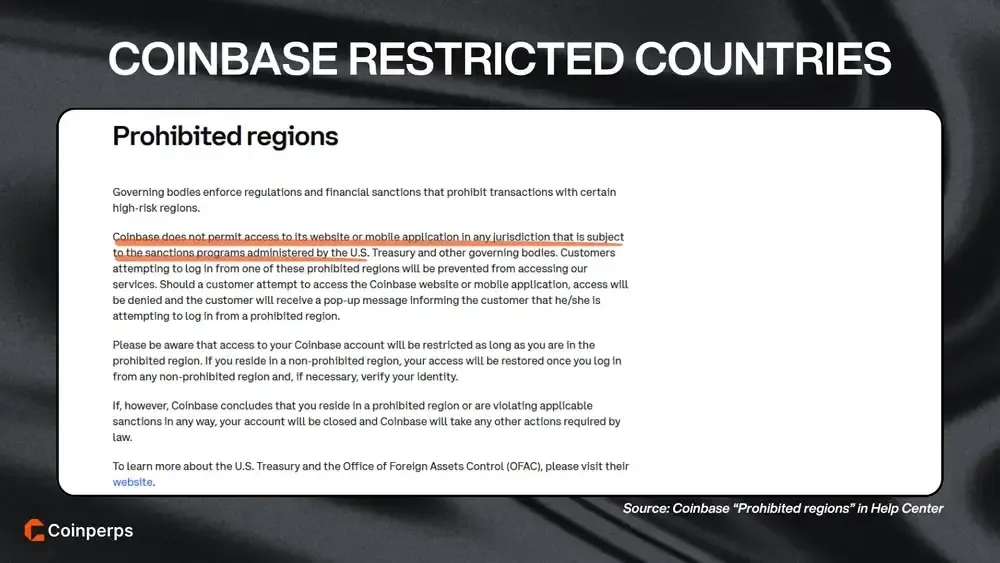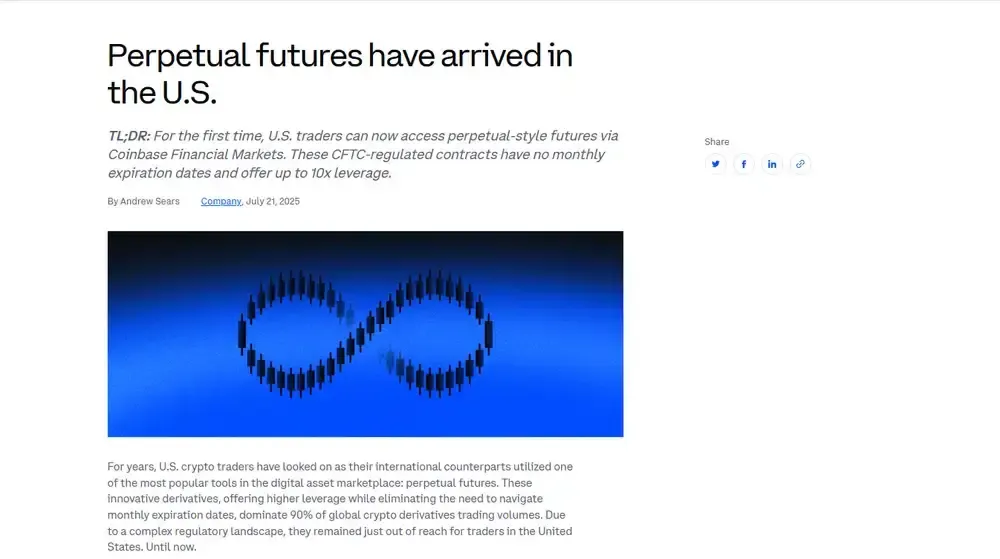- 24H Open Interest$92,361,820,995.86-0.11%
- 24h Liquidation$72,536,067.350%
- 24h long/short Ratio50.38% / 49.62%
- Fear & Greed Index8
- Bitcoin Price$67,940.8-0.16%
- Ethereum Price$1,972.590.26%
- Solana Price$84.940.07%
- XRP Price$1.43-0.5%
- 24H Open Interest$92,361,820,995.86-0.11%
- 24h Liquidation$72,536,067.350%
- 24h long/short Ratio50.38% / 49.62%
- Fear & Greed Index8
- Bitcoin Price$67,940.8-0.16%
- Ethereum Price$1,972.590.26%
- Solana Price$84.940.07%
- XRP Price$1.43-0.5%
Coinbase Perpetuals Restricted Countries List 2025 – Regions & Alternatives
Learn where Coinbase perpetuals are restricted, which countries are supported, fiat rails available, and the best alternatives like Kraken, Bybit, and Hyperliquid.
Key Takeaways:
- Coinbase restricts perpetual futures in OFAC-sanctioned jurisdictions, blocks UK retail access, and gates EU rollout by licensing in KYC-supported regions.
- Supported coverage spans 100+ countries with USD, EUR, and GBP rails, including ACH, Fedwire, SEPA, and Faster Payments, with withdrawal limits for verified accounts.
- If Coinbase perpetuals are unavailable where you live, consider Kraken in the U.S. and Europe, Bybit internationally with 125x, or Hyperliquid on-chain with 40x.
Coinbase Futures
Coinbase Futures offers US nano BTC and ETH contracts and 90+ global perpetual markets with $1.8B daily volume, but charges some of the industry’s highest fees.
Features
Fees
Regulation
Overall Rating
Having trouble accessing Coinbase perpetuals or unsure whether your country currently qualifies for derivatives trading? You might also be looking for clarity on KYC rules, fiat rails, and licensing coverage.
This guide breaks down where Coinbase perpetuals are restricted or supported, which fiat methods are active, and what licenses power their expansion across Europe and the U.S.
Read the full breakdown and best alternatives below. ⬇️
List of Coinbase Perpetuals Restricted Countries
Coinbase currently restricts access to its perpetual futures platform in over 20 OFAC-sanctioned jurisdictions, as outlined in the Coinbase Help Center's Prohibited regions and User Agreement.
These restrictions apply automatically to users logging in from the following countries:
- North Korea: Completely banned due to global sanctions on its financial system, cyber operations, and nuclear development activities enforced by OFAC and the U.N.
- Iran: Restricted from all Coinbase services because of U.S. trade embargoes prohibiting digital asset transactions tied to Iranian citizens or financial institutions.
- Cuba: Subject to long-standing OFAC restrictions that prevent U.S. companies from offering crypto, banking, or payment services within its territory.
- Syria: Barred under international anti-terrorism frameworks and export control rules designed to limit cross-border financial activity with sanctioned regimes.
- Russia (Crimea, Donetsk, Luhansk): Excluded following coordinated U.S. and EU sanctions responding to Russia’s occupation of Ukrainian regions and related financial networks.
- Mainland China: Unavailable due to overlapping export control measures and China’s own domestic prohibitions on cryptocurrency trading and derivatives.
- Sudan and South Sudan: Blocked for links to humanitarian sanctions and global financial restrictions targeting conflict-related money flows.
- Other high-risk territories: Covers additional regions listed on consolidated OFAC, U.N., or U.K. sanctions lists, subject to Coinbase’s compliance verification.

Countries and Currencies Supported by Coinbase Perps
Coinbase serves verified users across 100+ countries, supporting global crypto trading, payments, and derivatives under established financial compliance frameworks. The platform provides regulated fiat rails for USD, EUR, and GBP, enabling direct deposits, withdrawals, and conversions.
Below is the list of fiat currencies currently supported on Coinbase:
- USD (United States Dollar): Used for ACH and Fedwire transfers, offering free deposits and fixed-fee withdrawals through U.S. banking channels.
- EUR (Euro): Supported via SEPA transfers with low €0.15 deposit fees, enabling smooth transactions within the European Economic Area.
- GBP (British Pound Sterling): Facilitates crypto purchases and withdrawals through SWIFT and Faster Payments, combining low costs with rapid processing times.
Coinbase maintains affordable fiat deposit and withdrawal fees, free for ACH, €0.15 for SEPA deposits, and £1 for Faster Payments withdrawals, with standard daily withdrawal limits of $100,000 / €100,000 / £100,000.

Does Coinbase Require Mandatory KYC Verification?
Yes, Coinbase requires all users to complete mandatory Know Your Customer (KYC) verification before accessing its full range of services. This process ensures compliance with anti-money laundering rules and helps prevent fraud, identity theft, and financial crime.
Verification involves submitting a valid government-issued ID, proof of address, and occasionally a short video check to confirm identity. Accepted documents include passports, driver’s licenses, or national IDs, supported by recent bank or utility statements as address proof.
Coinbase treats KYC as a continuous process rather than a one-time check, with periodic updates and risk-based due diligence reviews. Users may be asked for additional personal or financial details, such as source of funds, if higher verification levels are required.
The exchange also performs ongoing monitoring for fraud, sanctions, and unusual account activity to comply with regulators including FinCEN and OFAC. Periodic information refreshes help ensure data accuracy, transparency, and uninterrupted access to all Coinbase products and services.

Is Coinbase Perpetuals Banned in the US?
Coinbase Perpetuals are now available in the United States after their July 2025 launch under the CFTC-regulated Coinbase Financial Markets (CFM). The new U.S. Perpetual-Style Futures let domestic traders access perpetual-like contracts in a fully compliant, federally supervised environment.
These contracts operate as long-dated futures with five-year expirations that track spot prices while meeting U.S. clearing and margin requirements. The rollout replaced years of offshore reliance by giving U.S. traders an accessible and regulated alternative for leveraged crypto exposure.
Currently, Coinbase lists nano Bitcoin (BTC-PERP) and nano Ether (ETH-PERP) perpetual-style contracts trading 24/7 with hourly funding and up to 10x leverage. More listings are planned as CFM expands its regulated derivatives offering across U.S. markets.

Does Coinbase Restrict Perpetuals Trading in Europe?
Coinbase supports perpetual futures trading in Europe through its MiFID II license, held by its Cyprus-based subsidiary, Coinbase Financial Services Europe. This authorization enables the company to offer regulated derivatives across EU member states under a single passported framework.
The exchange already provides verified access in more than 40 European countries, covering nearly all members of the European Economic Area. Users in these jurisdictions can trade, invest, and hold digital assets while remaining fully compliant with EU financial regulations.
What Licenses Does Coinbase Perpetuals Have?
Coinbase Perpetuals operates under a comprehensive licensing framework that ensures full regulatory compliance across the Atlantic in every major jurisdiction where the platform is active.
Below is a list of Coinbase’s primary licenses for its perpetual and derivatives services:
- United States (Coinbase Financial Markets, Inc.): Regulated by the CFTC and NFA as a registered Futures Commission Merchant for crypto derivatives.
- United States (LMX Labs, LLC): Operates as a Designated Contract Market under the CFTC, authorizing perpetual and standard futures trading.
- European Union (Coinbase Financial Services Europe Ltd.): Licensed by CySEC under MiFID II, supporting regulated derivatives trading across passported EU jurisdictions.
- European Union (Coinbase Luxembourg S.A.): Holds a MiCA license from CSSF, enabling unified crypto and derivatives services in all 27 EU states.
- Germany (Coinbase Germany GmbH): Authorized by BaFin to provide crypto custody and trading services within Germany’s national regulatory framework.
- Ireland (Coinbase Europe & Coinbase Ireland Ltd.): Supervised by the Central Bank of Ireland as both a VASP and electronic money institution.
- United Kingdom (CB Payments Ltd.): Registered with the FCA as an electronic money institution and authorized for limited cryptoasset operations.
- United States (Coinbase Custody Trust Company, LLC): Chartered by the NYDFS as a limited purpose trust company for secure institutional custody.
Best Perpetual Alternatives if Coinbase is Unavailable
If Coinbase perpetual futures are unavailable in your region, several reputable alternatives offer comparable liquidity, leverage, and regulatory strength. Traders can choose between centralized and decentralized platforms depending on their jurisdiction, trading needs, and custody preferences.
Below is a quick comparison of leading perpetuals exchanges:
1. Kraken: Regulated and Reliable in the U.S. and Europe
Kraken offers a compliant, transparent environment for perpetual and futures traders across the U.S., EEA, and select global markets. With strong oversight from CFTC and European regulators, it provides up to 50x leverage, audited reserves, and advanced risk controls.
Its Kraken Futures platform hosts 150+ perpetual contracts with deep liquidity, institutional-grade execution, and some of the lowest taker fees among regulated exchanges. The platform appeals to professional traders seeking stability, verified transparency, and access to both crypto and fiat funding channels.
2. Bybit: High-Leverage Global Perpetuals Platform
Bybit dominates perpetuals trading outside the U.S., offering up to 125x leverage across more than 300 markets with world-class liquidity. Based in Dubai and regulated by VARA, it continues expanding its compliance reach under MiCA in Europe.
It combines high-speed derivatives trading with competitive fees, tiered VIP discounts, and deep market depth rivaling Binance. Bybit’s responsive risk controls and rapid compensation after its 2025 breach have reinforced its position as a top-tier global exchange.
3. Hyperliquid: Fully On-Chain Alternative for DeFi Traders
Hyperliquid powers over 70% of DeFi perpetuals volume through an on-chain order book and custom Layer-1 blockchain built for trading performance. It delivers near-instant settlement, transparent funding rates, and gas-efficient executions rivaling centralized exchanges, with leverage up to 40x.
While unregulated, Hyperliquid ensures non-custodial safety, as users retain asset control through smart contracts and real-time verifiability. It’s best suited for advanced traders who prioritize decentralization, on-chain transparency, and global accessibility over traditional compliance.
Bottom Line
Coinbase’s MiFID II and MiCA footholds position it to expand perpetual futures across Europe, with gradual passporting and country-by-country activation expected through ongoing 2025 rollouts.
U.S. perpetual-style futures continue under CFTC and NFA oversight, with product breadth and contract depth likely to increase as liquidity consolidates and retail tools mature responsibly.
UK retail access remains contingent on FCA policy changes, so traders should watch regulatory updates while employing compliant alternatives like Kraken, Bybit, or Hyperliquid as needed.
Frequently asked questions
Yes, Coinbase holds EU authorization and MiCA coverage, with availability rolling out under local passporting. Check eligibility in Coinbase Advanced for your country.
No. Coinbase enforces location-based eligibility and sanctions screening. VPN access can trigger compliance reviews and account restrictions under the User Agreement.
USD, EUR, and GBP are supported via ACH, Fedwire, SEPA, and Faster Payments. Funding eligibility and limits depend on verification level and your jurisdiction.
Yes. Coinbase applies contract-level limits and leverage caps by tier, with hourly funding and risk controls that align futures prices with spot markets.
.avif)